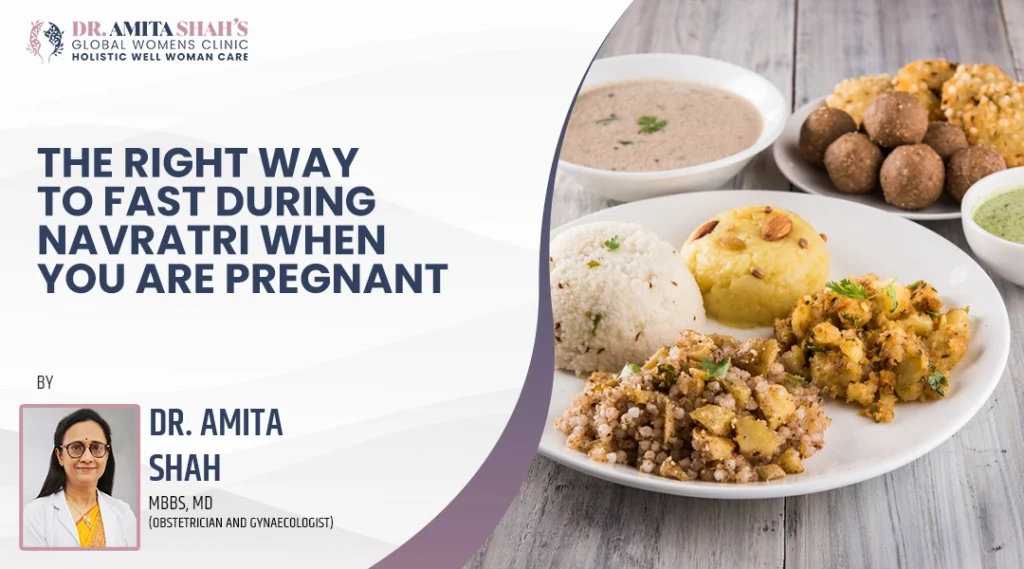Gestational Diabetes is a condition where you develop high sugar levels during pregnancy. It makes your pregnancy a High Risk Pregnancy and if not properly taken care of, may lead to complications for the mother as well as the baby. If diagnosed early and treated well by your doctor, there is nothing to worry about. Dr Amita Shah is an expert in High-risk Pregnancy Management and has successfully delivered these patients by Normal Delivery.

What is Gestational Diabetes?
If you develop Diabetes during your pregnancy which you never had before pregnancy, it is called Gestational Diabetes or GDM. It happens because of the hormonal changes during pregnancy.
What is the reason for developing Gestational Diabetes?
Normally, the food that you consume after various processes is broken down into glucose in the body. This glucose is then utilized by the insulin produced by the pancreas to be converted into sugar and energy that is used by our body. In some women, during pregnancy because of insufficient production of insulin or inadequate utilization of glucose by the body, blood sugar level rises leading to Gestational Diabetes. This happens because of hormonal changes during pregnancy.
Who can develop Gestational Diabetes / Who is at risk?
Anyone can develop Diabetes during pregnancy, but you are at greater risk if
- You are more than 35 years of age
- You are obese/your BMI is significantly high
- Hereditary factor – means there is a family history of diabetes in your parents/grandparents
- You are carrying twins/triplets
- Previous history of gestational diabetes
- Previous history of having a big baby /unexplained fetal loss
- If you have high blood pressure
How do I know I have Gestational Diabetes?
Mostly there are no symptoms to suggest that you have Gestational diabetes. For all pregnant patients, the doctor will get the screening test for Diabetes at least three times during the pregnancy. The first screening test is generally done in the first trimester for high-risk patients, otherwise around 20-24 weeks.
This screening test is known as GCT ( Glucose Challenge Test ) wherein you are asked to drink 50 gms of glucose and blood sugar is tested after 1 hour, ideally, the blood sugar should be less than 140. If the blood sugar is higher, then you need to undergo another test called GTT( Glucose Tolerance Test ). In this test, you have to give one blood sample fasting and then drink 100 gms of glucose and give two blood samples, one after one hour and the second after 2 hours. Out of the three blood samples, if two are more than normal, this confirms you have gestational Diabetes.
The normal sugar levels taken are Fasting- 90-100 Post 2 hours 120-130
How can Gestational Diabetes Affect my Pregnancy and Baby?
If you are sugar and diabetes are well controlled, you will deliver a healthy baby and have an uneventful pregnancy. But, if Diabetes is uncontrolled, it can lead to issues that may include:
- Macrosomia / Large Baby – this happens because of excess sugar going to the baby, leading to an increase in weight of the baby and especially deposition of fat in the upper part of the baby. It is like overfeeding the baby. This leads to:
- o Difficulty in Normal Delivery leading to Shoulder Dystocia
- o Increases chances of Cesarean Delivery
- o Increases risk of Pre-term delivery
- Hypoglycemia of the Baby After Birth– this happens because the baby still produces more insulin than it was when in utero in response to more sugars it was getting from the mother. After delivery, this stops and the baby’s blood glucose levels drop dangerously.
- Respiratory Problems – babies born to Gestational Diabetic mothers face respiratory distress because of late maturation of the lungs.
- New Born Jaundice – Babies born to Gestational Diabetes mothers have a higher chance of developing jaundice after birth.
- Risk of IUD – There is an increased incidence of stillbirth i.e. babies dying in-utero because of high sugars in the mother
- Obesity and Higher Chance of Getting Diabetes in Future – kids born to mothers with Gestational Diabetes have a higher chance of developing obesity, and being overweight and are more likely to develop diabetes in future.
How is Gestational Diabetes Treated?
Your doctor will put you on a strict Diabetic diet, which is completely no sugar and low carbohydrate. You will have to take small frequent meals and avoid large meals to keep the sugars low. It is very important to do some walking after each meal as it helps to keep your post-meal sugars low. With Diet and exercise, you should aim to keep your weight gain in control. In case, the diet and exercise do not help to keep your blood sugars in check, your doctor will have to put you on medicines for Diabetes. In pregnancy, most Oral anti-diabetic drugs cannot be given, so you will have to be put on Insulin. Taking insulin is easy and can be done at home by yourself. You will also have to monitor your blood sugar levels regularly.
How can I prevent Gestational Diabetes?
Unfortunately, there are no clear-cut ways to prevent Gestational Diabetes. But if you eat healthy, exercise regularly and maintain a correct BMI before conceiving, you can reduce the chance of developing Gestational Diabetes.
Will I continue to have Diabetes post-delivery?
In most women, the blood sugar levels come down to normal levels in 6-8 weeks. However, in about 20-30% of women, there may still be some impaired glucose tolerance, meaning higher chances of sugar levels being high, eventually developing into full-blown Diabetes.
Doctor Profile
Dr Amita Shah is a leading gynaecologist in Gurgaon with vast experience in treating all major and minor female problems. She is the founder of ‘Global Women Clinic’ in Palam Vihar, Gurgaon. For more information or an appointment with Dr Amita Shah please call 9773975611
































